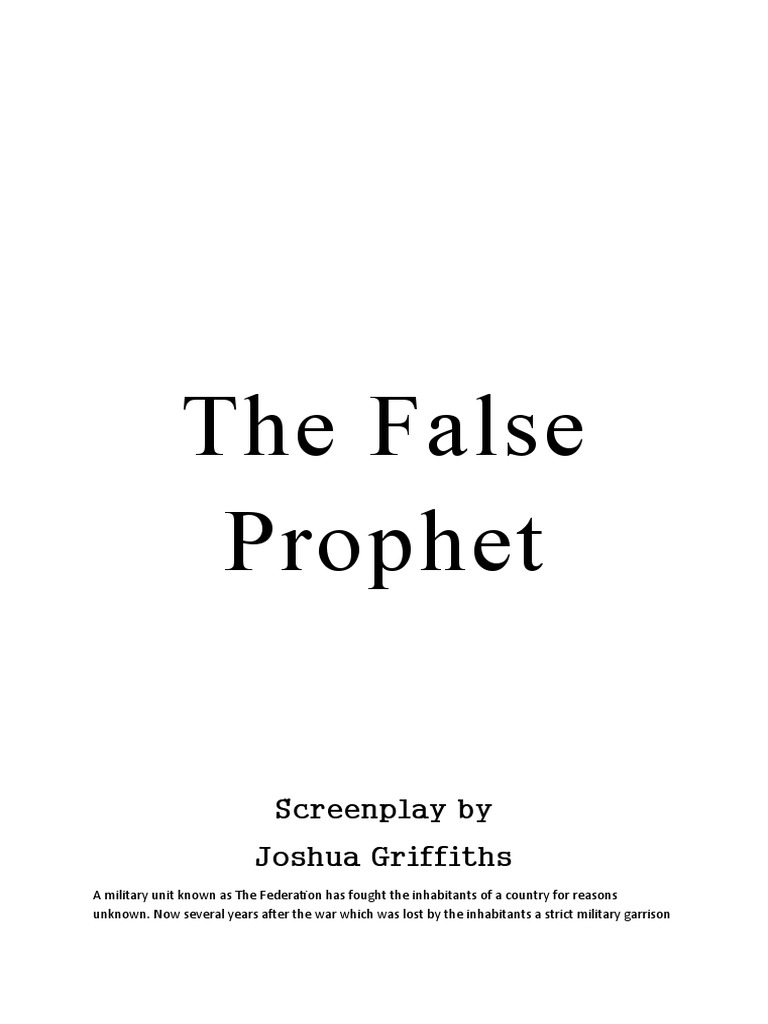The concept of a false prophet is a significant theme within the Bahá’í teachings, prominently embodied within the framework of the faith’s understanding of divine messengers and the unfolding of human spiritual evolution. In Bahá’í doctrine, the emergence of divine prophets is not merely a historical phenomenon but a continual process that shapes the moral and ethical landscapes of societies across epochs. This exploration will elucidate the characteristics of a false prophet, contrasting them with the attributes of true divine manifestations, as well as the implications of recognizing and responding to these figures within the Bahá’í context.
1. Definition of a False Prophet
A false prophet can be defined as an individual who claims to convey a divine message from God but does not possess the authenticity of divine inspiration. Essentially, such figures may manipulate spiritual teachings for personal gain, consequently misleading their followers. In the Bahá’í understanding, the hallmark of a false prophet lies in their lack of alignment with the tenets and principles set forth by the historical figures of faith, such as Bahá’u’lláh, the founder of the Bahá’í Faith.
2. Historical Context
The era of human development has witnessed the emergence of various religious figures. While many have sincerely espoused truth, history chronicles a multitude of self-proclaimed prophets who deviated from genuine spirituality. In the Bahá’í view, the explanation of such figures arises from an intrinsic understanding that humanity evolves progressively towards a greater comprehension of divine will. These aberrations serve to underscore the need for discernment in recognizing true prophets.
3. Characteristics of a False Prophet
- Self-serving Motives: False prophets often seek personal aggrandizement, utilizing spiritual authority to amass wealth, power, or influence.
- Contradictory Doctrine: Teachings propagated by false prophets frequently conflict with those of established true prophets, introducing confusion or division among believers.
- Lack of Transformation: Genuine prophets inspire profound spiritual and moral transformation. In contrast, false prophets may offer superficial promises without fostering true change in individuals or communities.
- Absence of Unity: A hallmark of true divine messages is the emphasis on unity. False prophets often instigate discord and sectarianism, undermining the collective pursuit of spiritual progress.
- Charismatic Manipulation: While charisma can be a genuine trait of a true prophet, false prophets often exploit this attribute to command blind adherence from followers.
4. The Role of Discernment
For individuals within the Bahá’í community, the necessity of discernment is paramount. This ability allows one to differentiate between true spiritual guidance and misleading proclamations. Bahá’í teachings advocate for a reasoned approach: the utilization of intellect, consultation with respected community members, and engagement with sacred texts to navigate these spiritual complexities. In this manner, adherents cultivate a framework for assessing the validity of claims made by potential prophets.
5. The Prophetic Cycle
Bahá’í teachings posit that God sends prophets in cycles, reflecting the evolving needs of humanity. Each of these divine manifestations contributes to a cumulative body of religious knowledge. Bahá’u’lláh, as the latest in a lineage of prophets that includes Moses, Jesus, Muhammad, and others, emphasizes a fundamental principle: the unity of all prophets and the continuity of divine revelation. This perspective elucidates why identifying false prophets is so critical; detachment from this unity leads to schism and spiritual fragmentation.
6. Recognizing True Prophets
To counter the influence of false prophets, Bahá’ís are encouraged to familiarize themselves with the characteristics of true divine manifestations. These may include:
- Embodiment of Virtue: True prophets typically exemplify moral and ethical principles, serving as living examples of their teachings.
- Promotion of Universal Harmony: Their messages are characterized by a deep commitment to the oneness of humanity and universal peace.
- Literary Excellence: The sacred writings and teachings of true prophets resonate with eloquence and profundity.
- Fulfillment of Prophecy: Historical predictions fulfilled through their advent often serve as markers confirming their authenticity.
7. The Social Implications of False Prophets
The existence of false prophets carries significant socio-spiritual consequences. They can instigate divisions within communities, fostering sectarian beliefs that hinder collective progress. The moral vacuity often associated with such figures may erode the faith of genuine believers, making it imperative for individuals and communities to remain vigilant against misguided ideologies. Bahá’ís are called not only to guard against such figures but also to embody teachings of love and inclusivity that transcend the divisive narratives often propagated by false prophets.
8. Conclusion: The Path Forward
In addressing the question of false prophets, it becomes evident that intentional discernment, coupled with adherence to the universal teachings of Bahá’u’lláh, provides a robust framework for spiritual navigation. The challenge lies not only in identifying these misleading figures but also in remaining steadfast in the pursuit of truth, unity, and the inherent purpose of divine teachings: to uplift humanity and promote the well-being of all. Adherence to the Bahá’í principles offers a bulwark against the multifaceted nature of false prophecy, ensuring that humanity’s journey towards collective enlightenment is not derailed by the enticements of deceitful claims.
